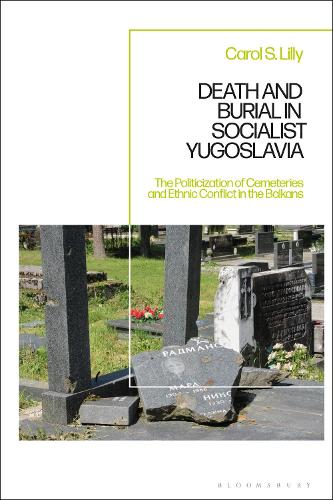
Death and Burial in Socialist Yugoslavia: The Politicization of Cemeteries and Ethnic Conflict in the Balkans
(Hardback)
Available Formats
Publishing Details
Death and Burial in Socialist Yugoslavia: The Politicization of Cemeteries and Ethnic Conflict in the Balkans
By (Author) Carol S. Lilly
Bloomsbury Publishing PLC
Bloomsbury Academic
8th February 2024
United Kingdom
Classifications
Tertiary Education
Non Fiction
European history
Physical Properties
Hardback
344
Width 156mm, Height 234mm
Description
Across the globe, memorial and grave sites are being increasingly weaponized in conflicts and politicized by parties to advance agendas. Here, Carol S. Lilly examines ideas of death, politics, memory, ideology and nationalism in the former Yugoslav republics of Bosnia-Hercegovina, Croatia, and Serbia to shine fresh light on cemetery culture in 20th-century Europe. More specifically, Death and Burial in Socialist Yugoslavia investigates how the Communist Party of Yugoslavia created its own communities of the dead by implementing cemetery policies which reinforced their ideals of secularism, pluralism, brotherhood, and unity. However, in doing so the communist regime left the previous system of ethno-religious segregation in place and further isolated Catholics, Orthodox, Muslims and Jews who continued to be buried in separate locations. This in turn further politicized burial rites and exacerbated tensions between different ethno-religious communities. As a result, by the time Yugoslavia disintegrated in the early 1990s, dead bodies and cemeteries had become a concerted weapon of war in the ongoing ethnic conflict. Ultimately, then, this timely study reveals for the first time the extent to which the communist regime not only failed to created their own communities of the dead but also further divided and alienated living communities in Yugoslavia.
Author Bio
Carol S. Lilly is Professor of History and Director of International Studies Program at University of Nebraska Kearney, USA. She is the author of Power and Persuasion: Ideology and Rhetoric in Communist Yugoslavia, 1944-1953 (2000) and co-editor of Natalija: Life in the Balkan Powderkeg (2011, with Jill Irvine).
